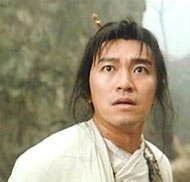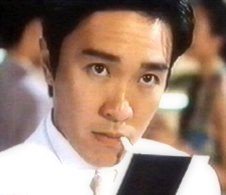No space for teh tarik?? YAU MOU GAU...CHOR!!
No space for teh tarik
MOSCOW: There will be no teh tarik-making or roti canai-tossing experiments in space for our Angkasawan when he blasts off in October.
Instead, he will carry out at least 10 laboratory tests for serious research designed by 10 universities, institutes of higher education and government science agencies.
Science, Technology and Innovation Minister Datuk Seri Dr Jamaluddin Jarjis said the experiments were important as “they will have an important impact on our local food and medical industries”.
“All the experiments done in space so far are for the benefit of the countries that sponsored their scientists to fly to space.
“There have been no scientific studies in space on any Asian interest, in terms of medicine or food technology.
“The Americans do experiments for their own industries and they do not share their findings. It is the same with the Russians or Japanese; they will not share. This is why it is important for our Angkasawan to carry out these tests,” he said.
Dr Jamaluddin had earlier visited the two Angkasawan candidates, Dr Sheikh Muszaphar Sheikh Shukor and Dr Faiz Khaleed, at the Yuri Gagarin Cosmonaut Training Centre at the Russian Star City about 35km from here.
The institutes, which drew up the experiments and will supervise the Angkasawan, are Universiti Kebangsaan Malaysia, Universiti Malaya, Universiti Teknologi Mara, Universiti Darul Iman, Universiti Putra Malaysia, Malaysian Genome Institute, Aviation Medicine Institute, Sunway University College, Health Ministry and Malaysian Agriculture Research and Development Institute (Mardi).
The experiments will be in the fields of life sciences, space medicine, physics education and food technology.
The Angkasawan, who gets to carry 15kg of equipment on board the Russian Soyuz spacecraft, will do tests on the effects of microgravity and space radiation on microbes, cells, food and crystals. (See chart for details.)
Dr Jamaluddin hoped that the release of the details of these experiments would put paid to earlier reports about the Angkasawan having to make teh tarik or toss roti canai in space.
“We are not sending up a space tourist. Whoever is chosen will be carrying out ground-breaking experiments with serious implications on our economy.
“Mardi’s research to be carried out will have serious implications on how we can pack our foodstuff for export in the future. We may be able to get Malaysian foodstuff packed in a manner that it stays fresh for a longer time.
“These kinds of experiments can only be done quickly in an environment like space,” he added.
The Angkasawan programme is part of Malaysia’s purchase of the Sukhoi multi-role fighter aircraft from the Russians in 2000.
Unlike other countries that have to pay the Russians to send their astronauts to space, the entire programme is borne by the Russians.
MOSCOW: There will be no teh tarik-making or roti canai-tossing experiments in space for our Angkasawan when he blasts off in October.
Instead, he will carry out at least 10 laboratory tests for serious research designed by 10 universities, institutes of higher education and government science agencies.
Science, Technology and Innovation Minister Datuk Seri Dr Jamaluddin Jarjis said the experiments were important as “they will have an important impact on our local food and medical industries”.
“All the experiments done in space so far are for the benefit of the countries that sponsored their scientists to fly to space.
“There have been no scientific studies in space on any Asian interest, in terms of medicine or food technology.
“The Americans do experiments for their own industries and they do not share their findings. It is the same with the Russians or Japanese; they will not share. This is why it is important for our Angkasawan to carry out these tests,” he said.
Dr Jamaluddin had earlier visited the two Angkasawan candidates, Dr Sheikh Muszaphar Sheikh Shukor and Dr Faiz Khaleed, at the Yuri Gagarin Cosmonaut Training Centre at the Russian Star City about 35km from here.
The institutes, which drew up the experiments and will supervise the Angkasawan, are Universiti Kebangsaan Malaysia, Universiti Malaya, Universiti Teknologi Mara, Universiti Darul Iman, Universiti Putra Malaysia, Malaysian Genome Institute, Aviation Medicine Institute, Sunway University College, Health Ministry and Malaysian Agriculture Research and Development Institute (Mardi).
The experiments will be in the fields of life sciences, space medicine, physics education and food technology.
The Angkasawan, who gets to carry 15kg of equipment on board the Russian Soyuz spacecraft, will do tests on the effects of microgravity and space radiation on microbes, cells, food and crystals. (See chart for details.)
Dr Jamaluddin hoped that the release of the details of these experiments would put paid to earlier reports about the Angkasawan having to make teh tarik or toss roti canai in space.
“We are not sending up a space tourist. Whoever is chosen will be carrying out ground-breaking experiments with serious implications on our economy.
“Mardi’s research to be carried out will have serious implications on how we can pack our foodstuff for export in the future. We may be able to get Malaysian foodstuff packed in a manner that it stays fresh for a longer time.
“These kinds of experiments can only be done quickly in an environment like space,” he added.
The Angkasawan programme is part of Malaysia’s purchase of the Sukhoi multi-role fighter aircraft from the Russians in 2000.
Unlike other countries that have to pay the Russians to send their astronauts to space, the entire programme is borne by the Russians.








0 Comments:
Post a Comment
<< Home